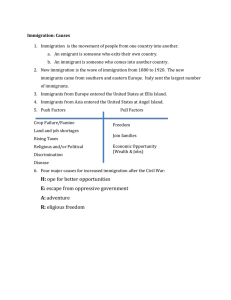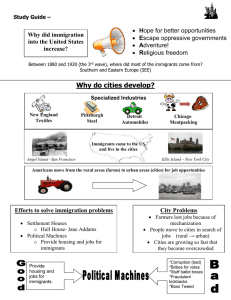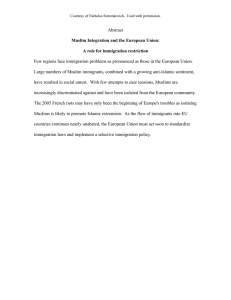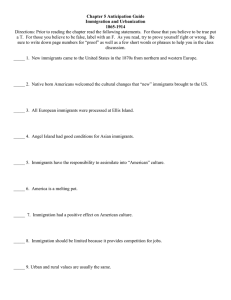One of the more remarkable aspects of the continuing debate... American immigration policy is that the nation's liberal elites seem,
advertisement
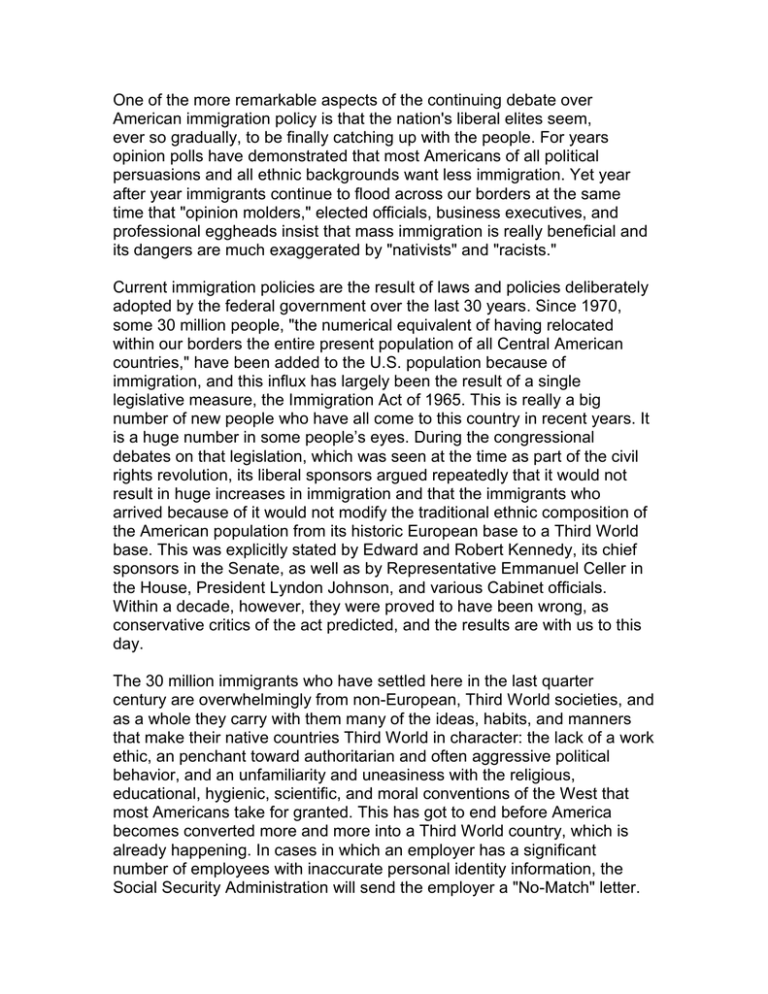
One of the more remarkable aspects of the continuing debate over American immigration policy is that the nation's liberal elites seem, ever so gradually, to be finally catching up with the people. For years opinion polls have demonstrated that most Americans of all political persuasions and all ethnic backgrounds want less immigration. Yet year after year immigrants continue to flood across our borders at the same time that "opinion molders," elected officials, business executives, and professional eggheads insist that mass immigration is really beneficial and its dangers are much exaggerated by "nativists" and "racists." Current immigration policies are the result of laws and policies deliberately adopted by the federal government over the last 30 years. Since 1970, some 30 million people, "the numerical equivalent of having relocated within our borders the entire present population of all Central American countries," have been added to the U.S. population because of immigration, and this influx has largely been the result of a single legislative measure, the Immigration Act of 1965. This is really a big number of new people who have all come to this country in recent years. It is a huge number in some people’s eyes. During the congressional debates on that legislation, which was seen at the time as part of the civil rights revolution, its liberal sponsors argued repeatedly that it would not result in huge increases in immigration and that the immigrants who arrived because of it would not modify the traditional ethnic composition of the American population from its historic European base to a Third World base. This was explicitly stated by Edward and Robert Kennedy, its chief sponsors in the Senate, as well as by Representative Emmanuel Celler in the House, President Lyndon Johnson, and various Cabinet officials. Within a decade, however, they were proved to have been wrong, as conservative critics of the act predicted, and the results are with us to this day. The 30 million immigrants who have settled here in the last quarter century are overwhelmingly from non-European, Third World societies, and as a whole they carry with them many of the ideas, habits, and manners that make their native countries Third World in character: the lack of a work ethic, an penchant toward authoritarian and often aggressive political behavior, and an unfamiliarity and uneasiness with the religious, educational, hygienic, scientific, and moral conventions of the West that most Americans take for granted. This has got to end before America becomes converted more and more into a Third World country, which is already happening. In cases in which an employer has a significant number of employees with inaccurate personal identity information, the Social Security Administration will send the employer a "No-Match" letter. The regulation clarifies that employers may be held liable if they ignore the "No Match" problems by failing to take specified steps within 90 days of receiving the letter. America has longed battled the issue about immigration. Today people in general have a very mixed feeling about the issue of immigration. Immigrants escaping from prosecution built the United States. Today, America firmly tries to solve many of our economical, political and social difficulties due to the burden of the thousand immigrants that enters the United States. Many people argue that immigrants steal jobs from the loyal Americans. Overcrowds schools, ruin health care system and abuse health and public and federal services. Michael Huffington, a former member of the U.S House of Representatives from California, explains: Spending on illegal immigrants is out of control.? On the other hand, many argue that immigrants are actually good for America’s present and future status. Statistics show that immigrants lower unemployment rates, pay more taxes and expand our economy by consumption of goods and other services. Immigrants also increase jobs and improve schools. As more Americans become aware of the issue, the more questions are aroused and the fewer answers we come across. In conclusion, it is precisely the refusal of the political, industrial, and cultural elites in the United States to take any actions to control or bring immigration to a halt that is so fear-provoking. The proof for the real significance of immigration -- the lowering of wages, the dislocation of workers, the boost in crime, the heightening of ethnic and racial conflict, the disintegration of the bonds of nation and culture, and the sheer weight of numbers on natural resources and an eroding infrastructure -- is now overwhelming, and still the political leadership of both parties regurgitates the clichés about "a nation of immigrants" and our "international responsibility."


